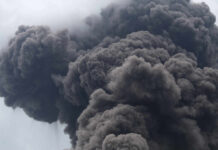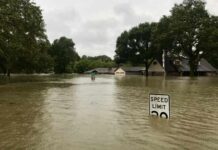
Galveston, Texas, found itself grappling with potential environmental ramifications following a barge collision on Wednesday, with estimates suggesting a spill of up to 2,000 gallons of oil into surrounding waters, according to the U.S. Coast Guard’s statement on Thursday.
A barge has hit a bridge in Galveston, Texas, collapsing the rail line. pic.twitter.com/UaQDawRrzv
— 🇺🇸ProudArmyBrat (@leslibless) May 15, 2024
The collision occurred as the barge, detached from the tugboat towing it, collided with a support structure of the Pelican Island Causeway span. This impact led to a partial collapse of the bridge, severing the crucial link between Galveston and Pelican Island.
A large barge just struck the bridge to and from Pelican Island in Galveston, Texas.
Will Pete Buttigieg blame the bridge and say it’s racist?
Was DEI at play here?pic.twitter.com/T7XwPYoxK3
— Paul A. Szypula 🇺🇸 (@Bubblebathgirl) May 15, 2024
Initial evaluations of cleanup operations indicated no significant harm to local wildlife, although visual evidence depicted oil patches dispersing in Galveston Bay post-incident.
Coast Guard Captain Keith Donohue expressed confidence in a reduced spill volume than initially projected, stating, “We’ve recovered over 605 gallons of oily water mixture from the environment, as well as an additional 5,640 gallons of oil product from the top of the barge that did not go into the water.”
Efforts to contain the spill included the deployment of containment booms, along with drone surveillance and personnel assessments to gauge oil dispersion.
The incident necessitated the closure of approximately 6.5 miles of the waterway. Investigations revealed that a coupling failure between the tugboat and the 321-foot barge resulted in the loss of control.
As of Thursday, the barge remained adjacent to the bridge, restrained by debris, including dislodged rail lines. While inbound traffic to the Pelican Island Bridge remained halted, outbound vehicles and pedestrians faced no restrictions.
Texas A&M University at Galveston, situated on Pelican Island, proactively advised staff and faculty to vacate the campus, relocating residents until bridge repair uncertainties are resolved.
Despite concerns regarding environmental impact, experts like Maria Burns from the University of Houston suggest that the accident’s economic disruption to the region is expected to be minimal, given its distance from major shipping lanes.
This incident follows a recent cargo ship collision with a Francis Key Bridge support column in Baltimore on March 26, resulting in the tragic loss of six construction workers’ lives.

























